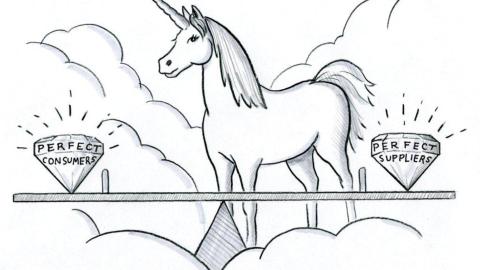Food For Rethinking Market Efficiency

Do “free markets” deliver efficiency as advertised? Businesses often ignore the utopian assumptions that would take. So should we.
1. By what stretch of reason, or misuse of words, can it be considered efficient that “~40% of food produced in America is thrown away,” while 18 million households are “food insecure”?
2. Economists use the label “efficient” differently, often meaning “Pareto efficiency”: a situation where no change in resource allocation can make anyone better off without making anyone else “worse off.” And economists often focus only on purchases, ignoring what happens after. But wasting 1,400 calories per person per day is neither Pareto, nor any other valid kind of efficient.
3. Economics entails ethics. Resource allocation always does. How’s that working in food? Or in garage-fulls of unused stuff? Some economists think that’s “efficient.” Most untheorized humans wouldn’t.
4. Reality is a thicket of “market failures,” which are framed as distortions to otherwise optimal outcomes caused by obstacles like “externalities” (factors not in prices). But this fails to recognize the everywhere evident resources misused by imprudent consumers.
5. Real efficiency in markets would need rational prudent purchasing. But businesses can profit by the opposite, by promoting imprudent spending. Economics mostly assumes we’re rational. Businesses know “there’s one born every minute.”
6. Relying on resource allocation in markets ends up making musical toilets. Somehow mechanistically see-saw-balancing supply and demand needs to get smarter.
8. The modern mechanistic market view arose in “The Marginal Revolution,” which appropriated 19th century physics methods “wholesale” (Mirowski). But economics also influenced physics. “The most important concept in physics,” the principle of energy conservation, was inspired by brewery accounts. And Leibniz said “God was like an architect” who worried “about his funds.”
8. “Free market” economics risks becoming a totalizing world-view, an all encompassing system, preached as the one true way. Worse than prior such ideologies, it comes shielded in “mathiness” that’s supposedly “value free.” But algebraic coherence guarantees neither useful truth nor sound ethics (especially with unrealistic assumptions).
9. Free-markets are like mathematical unicorns, elegant but unreal. They hide the last unlaughed-at Utopian ideas. Utopia is a pun meaning both perfect-place and no-place, and in no real place can free market assumptions really apply (perfect rationality etc).
Messy markets worked long before The Marginal Revolution’s physicsy theorizing. They will after we’ve stopped being besotted by utility maximizing robots and “Pareto efficient” unicorns. But without guidance markets will always create “profitable” waste.
Illustration by Julia Suits, The New Yorker Cartoonist & author of The Extraordinary Catalog of Peculiar Inventions.





